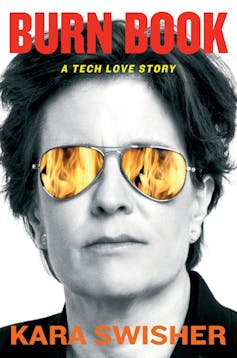Kara Swisher, tech’s most feared journalist, dishes the dirt on Silicon Valley
- Written by John Hawkins, Senior Lecturer, Canberra School of Politics, Economics and Society, University of Canberra

Burn Book[1] is that rare thing: a book about tech that can be enjoyed by readers who are not that into tech. It is a witty and engaging account of the rise (and often fall) of internet companies and the often dysfunctional talents behind them, told by an exceptionally well-connected outsider.
Kara Swisher is somehow regarded as both Silicon Valley’s “most feared” and “well-liked”[2] journalist. Perhaps this is best encapsulated in her rollercoaster relationship with Elon Musk, whom she knew, liked and often defended, but publicly fell out with a month after his Twitter purchase was finalised, telling him[3], “You may be my greatest disappointment in 25 years of covering tech.”
Swisher claims to be have been born in the same year as the internet: 1962[4]. Even as a child, “why” was her favourite word[5].
Her career took off[6] at the Washington Post, where she worked from the early 1990s on internet technology. Her interest was in the Silicon Valley geeks behind it – at the time regarded as “a backwater to a backwater” – rather than politics. A much-quoted line of hers[7], from the early 1990s[8], is that “everything that can be digitised will be digitised”. This epiphany changed her career.
Review: Burn Book: A Tech Love Story – Kara Swisher (Piatkus)
Swisher became riveted by the succession of “total domination followed by utter collapse” of various technologies – from CD-ROMs[9] to Myspace[10] – and the never-were businesses that just burned through investors’ funding and crashed – including grocery delivery startup Webvan[11], online delivery company Kozmo[12] and fashion e-tailer Boo.com[13].
‘I hope Kara never sees this’
Swisher has been described as having “a unique talent for coming off as simultaneously affable and hostile to her interview subjects”. A chief operating officer of Facebook was probably only half joking when she said Silicon Valley execs wrote on memos: “I hope Kara never sees this”.
Once when Yahoo co-founder Jerry Yang was in a board meeting, another board member texted Swisher about a decision they had just made and she texted Yang to confirm the information. He texted back, asking who was leaking and she replied “it’s the whole room”.
Swisher, who later became the West Coast correspondent for the Wall Street Journal, has spent her career “being hard on powerful people”. Channelling Spider-Man co-creator Stan Lee[14], she believes “with great power comes great responsibility”.
Her interest in tech and being a lesbian were both unusual during her early career as an investigative journalist. She referred to herself as “Sherlock Homo[15]”. In the United States, she is well enough known to have featured on The Simpsons[16], voicing herself.
Top tech entrepreneurs ‘lying to themselves’
The book is a memoir, but also a history of internet booms and busts. The title is taken[17] from Mean Girls[18], a film about high-school bullies.

















